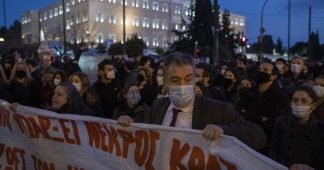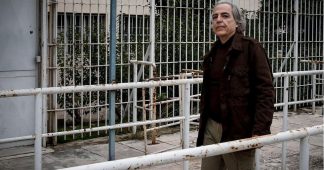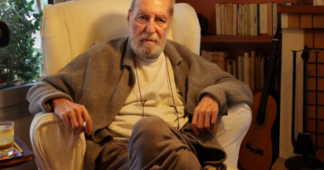By Dimitris Konstantakopoulos
8 March 2021
The Greek government seems capable – and the only one capable – of provoking a kind of revolution in the country! It has already achieved it in Nea Smyrni (a middle classes suburb of Athens), , where it has been able to get the otherwise hybernating Greek citizens out in the streets to protest against police violence in a massive way Nea Smyrni has not seen for decades.
The government performances in Halandri (another middle classes suburb of Athens), are also not bad. There the police stormed a popular vegetable market.
And, if the Varoufakis’ proposal to SYRIZA and KKE (CP of Greece) for joint action against threats to democracy is accepted, then the Greek government will have accomplished the “eighth miracle of the world”, that is, the co-operation of the Greek Leftist parties.
One does not know where to start and where to look in an out-of-control Greece, where (the government slogan) “law and order” quickly turns into its opposite. To hospitals that are falling apart? To the police running crazy and the new “Action” unit created by the government and specialized in beating anyone in an indiscriminate manner? Or to the performance of most of the Greek media, which is now comparable to the role that the media were playing under the colonels’ junta or under the Stalinist regime in USSR?
In one sense, the Greek media have surpassed those historical records, namely in their capacity to hide altogether important bits of information from public opinion. (Of course it is good to remember that neither the Greek media under the colonels or the Soviet media were able to save the respective regimes. On the contrary, not only did they precipitate their collapse, they finally made it more catastrophic).
We are even transiting now, from the control of information flows to the construction of “information”. Like the last poll, according to which seven out of ten Greeks are in favour of the government’s tough stance on the Koufontinas’ hunger strike, even if the prisoner dies. For this to be true means that this view is shared by a considerable part of SYRIZA, KINAL (ex-PASOK), Communist Party and MeRA25 (Varoufakis) voters…
With the momentum they have taken they will end believing such things themselves.
According to some informed sources, the Prime Minister is now strongly advised by people in his inner circle to remain steadfast on the issues of “order and security” in general and certainly on the Koufontinas issue. They are advising him to stand firm and disregard the opinion of some central figures of the establishment itself, like the director of the pro-government Vima newspaper, who advised him to adopt a more lenient attitude.
The legacy of the “Iron Lady”
The argument of these Prime Minister‘s advisers is that by remaining steadfast in the current political line on “order and security” issues, he has a historic opportunity to become a “Greek Thatcher”.
The temptation is great for the Prime Minister, as he is pressured by reality, to flee even more impetuously from it, with larger doses of the drug already proved to be poison. Fear can lead in different directions. A strong leader is keener to introduce reality into his calculation. A weak personality is on the contrary terrified by the prospect of destroying his own “image”.
A strong leader and personality could think coolly, and relent. A weak leader and personality is even more afraid of a retreat and is more easily trapped in a wrong path.
We must say from the very outset that a comparison of current Greek politicians with politicians such as Thatcher, de Gaulle, Roosevelt or Churchill, who led great transformations, is simply not serious. It can only be taken as a joke. Ambitions and fantasies are good, but one must compare them with reality so as not to be dragged into very big mistakes.
There is not a one in a million chance of a repeat of 1981 Thatcherism in 2021 and in Greece, both for subjective and objective reasons. If we’re talking about it here, it is because if you believe something, even if it’s completely unlikely, then you can produce important political results.
It is true that Thatcher took an absolutely callous stance on the issue of the hunger strike of Irish Republican fighters held in British prisons.
The indirect killing of the strikers was one of the innumerable crimes of the British Empire around the world, similar to what it did in Cyprus, where its representatives hung Greek youngsters and buried them in the so-called “Imprisoned Graves” (Fylakismena Mnimata), without even allowing their mothers and fathers to attend their burial.
This was the standard civilization level of British imperialism. And they wondered why they could not tame their small colony.
On another occasion, the “Iron Lady,” as her nickname was, ordered the sinking of an Argentinian ship and a thousand sailors treacherously, out of the field of operations which the British themselves defined during the Falklands War.
It is true that these crimes, and also the crushing of the great miners ‘ strike, did not seem to do Thatcher political harm. On the contrary they strengthened her political power. In the long term, of course, the policy of the “Iron Lady” laid the foundations of the de-industrialization of Britain, of its deep social crisis and has now brought the United Kingdom, a state with a centuries-old history, to the possibility of disintegration into its constituent parts. When Thatcher died, thousands of people around the world erupted in spontaneous manifestations of joy.
We shall not consider here the great moral questions raised regarding Thatcher’s legacy, and which, as Thucydides taught us, have both great importance and great political implications. We mean Thucydides of the Epitaph, not Thucydides as understood by many modern Greeks who, betraying their own morality and ignorance, believe he was teaching that justice does not matter, but only power.
Nor will we compare the personalities of Thatcher and Mitsotakis.
We will confine ourselves to examining three crucial reasons why the British precedent of the 1980s is not repeatable in Greece of 2021 and why any attempt to repeat it will have tragic consequences for the country, but also for those who attempt it.
The critical differences
First, Thatcher rode the steed of neoliberalism on its rise, not in its great crisis, as now. Even the leader of Greek anti-statism (ex-Minister) Stefanos Manos came out the other day, furious because he had remained six days without electricity in Ekali (a rich suburb of Athens), shouting ”Where is the state?” (during a recent storm that hit Greece). The global statistics of the pandemic are clear on this: so-called socialist countries and capitalist countries that did not go to extremist neoliberalism have withstood the COVID, while the US and Western Europe have suffered and are still suffering a health Waterloo.
With her policy Thatcher rallied (and said so) two-thirds of society against the poorest third. Here, even if they have disappeared from virtual television reality, half of the Greeks cannot survive and many do not even have enough to eat decently.
One and a half million Greeks at a productive age are out of production. The government is completely indifferent to the long-term unemployed, as if they do not exist.
As things go, one would need probably some form of dictatorship, open or concealed as long as we remain in the EU, in order to “persuade” all of them to quietly accept the prospect of extreme misery or even premature death. But it is very doubtful that a dictatorship based on such a narrow social as well as ideological basis can be imposed. An attempt to impose it will lead rather to a generalization of anarchy and decomposition of the country. Mitsotakis cannot become a dictator, but he can lay the ground for a future one.
Greece (like the whole West) does not need more neoliberalism, but, rather, a complete and radical abandonment of neoliberal doctrines, even if one believes that they had some advantages in 1980. The government’s deadly fiasco with the Greek NHS proves it amply.
Second, Thatcher rode the horse of the British imperial tradition. The Empire may have destroyed dozens of countries and peoples of the planet, but it has also distributed something of the super profits, out of the plunder of colonialism, to the British lower and middle classes, thus buying the complicity of part of British society.
The third and much more interesting difference between Thatcher and Mitsotakis is another one in our opinion. With her callousness over the death of Boby Sands and his comrades, Thatcher strictly adhered to the British legal order and protected, not destroyed the sovereignty and power of the British state.
Here is the great and critical difference: in the case of Koufontinas, the Greek state is clearly violating the Greek legal order. Greek law requires the transfer of Koufontinas to the Korydallos prison.
The prisoner has resorted to a hunger strike to enforce the law of the Greek state!
Sands was driven to death by application of the (inhuman) British law. Koufontinas is being led to death in violation of the Greek law and fighting for the application of the law.
Fighting terrorism or fighting democracy?
This story has very little to do with Koufontinas or with terrorism. Koufontinas was chosen as a target because he is the least defensible of Greek citizens and because anyone who dares to defend his rights easily ranks among the “friends”and “sympathizers ” of terrorism.
But in the position of Koufontinas, that is, of a citizen virtually defenseless against the uninformed violation of the law by state bodies, can be found tomorrow any leftist, rightist, centrist or apolitical citizen and on any issue, political or other.
Those who planned this case want to “educate”, by force of example, the citizens and to consolidate the view that no one can rely on the law and the state – the only solution is to submit to the will of those exercising power.
They are not interested in fighting a “terrorism” that has virtually disappeared from Greece as a threat to be reckoned with for two decades and which, if resurrected, genuine or fabricated, will be precisely because of this case. They are interested in fighting democracy.
It is a great honor for the Greek judges and prosecutors the fact they have understood that and reacted through their Union, as well as the Bar Associations of Patras and Piraeus and six members of Areios Pagos (the supreme court in Greece).
Because ultimately there are only two possible situations. The rule of law or the law of the jungle.
The Dictator
In fact, by using the pretext of terrorism or of the character of the prisoner’s past acts, there is a clear attempt, imperceptibly, to begin implementing a regime change, by introducing a regime of exception, which consists to the de facto recognition of the right of the power not to obey its own laws.
One of the deepest theoreticians of law, the German Karl Schmitt, has defined a dictator as follows: “Sovereign is he who decides on the exception.” For Schmitt, exception is not meant as the classical notion of using exceptional means to “save the constitution”, but rather as a mechanism to create another constitution.
The dictator was already introduced officially in Greece in 2010, in the form of the Troika, representative, in the last analysis, of the empire of the world financial capital. But his introduction at that time concerned only the economic policy of the state.
Now an attempt is being made to extend his power into what concerns the state monopoly of the legal use of power, which is the ultimate feature of a state power.
Looking again for useful idiots
“The biggest mistake we made in this case was the explicit provision in the law that Koufontinas will go to Korydallos prison” a reasonable person from the New Democracy party told me.
“If so, why don’t you fix it?” I asked him. Maybe Greek officials drafting the last law made a mistake. After all the Greek state is “error-prone”. But US officials closely supervising Greek anti-terrorist policy are not so “error-prone”.
Of course we may be wrong. It is hard to find decisive evidence and a “smoking gun” in such cases. Our impression is nevertheless that behind the Koufontinas case, as well as behind the whole doctrine of “law and order”, is hidden the same, radical and extremist faction at the very centre of imperial power (of the ruling empire of finance).
It is the same kernel which has used terrorism in order to launch the chain of devastating wars in the Middle East, the same which used us in 2010, in order to begin the demolition of the welfare state throughout Europe, the same which attacked Cyprus and acquired the control of its banks through the bail in program, the same which attacked in Ukraine in 2013-14, in order to begin the new Cold War, the same which used the defeat by capitulation of the Greek Left in 2015, in order to channel radicalism provoked by the crisis to the Far Right worldwide.
We are now moving from the demolition of the post-war European welfare state to the business of demolishing the remnants of bourgeois democracy and sovereignty of European nations. And they need a country – a “useful idiot ” – to start from somewhere, as in 2010, the whole process. Destroying what remains of European and Western democracy is also a precondition to launch new wars and for applying the doctrine of the “Clash of Civilizations”
They also need that the present government proceeds to actions which are not reversible and which will permanently entrap it in such a path.
How they convince our politicians
To convince the Greek elite to co-operate in such enterprises, many means and methods are used. But it is always better for it to believe that it is going to win something too, for the pill to be sugared, to see the cheese and not the trap, to think that all this will have a happy ending.
PM George Papandreou believed that he would save Greece with the help of American friends and the IMF. PM Antonis Samaras that they would restructure the Greek debt. PM Alexis Tsipras that American friends (again!) would secure him a presentable deal with the lenders.
They have convinced Mr. Mitsotakis, and they want to keep him convinced, that he will become the “Greek Thatcher” and it is necessary to do this, because ND may want such a direction of policy, but that does not mean that it is not also afraid of the consequences.
They even mobilized, in the absence of even a tiny official US statement, a retired diplomat, aspiring to become Ambassador to China, Nicholas Burns, to congratulate them for their firm stance. They began to publish outrageous polls, to convince both the government and the opposition, that the Greek people have changed into a people of man-eaters who wish or even do not care about the death of Koufontinas. Those methods are also directed to SYRIZA: they are seeking to convince its leadership that it is wrong to support Koufodinas. The only mistake Syriza has actually made is the exact opposite, that they did not protest much louder both inside the country and in Europe, not for Koufontinas only and in particular, but for the serious new threat against democracy in Greece. Not only SYRIZA, but the whole of European Left will pay again, as in 2015, the price.
By insisting upon this course, Mr. Mitsotakis will initiate disastrous processes, for both himself and the country, even if we cannot now accurately predict either when they will manifest themselves, or what form they will take, or even on what subject. Information may be blunted and distorted by the media system, but the truth never fully disappears. This was not done even in the darkest ages of history.
The information will pass to the collective national unconscious. Blood is not like the rhetorical battles of politicians on TV panels or in Parliament. It has the property of awakening the most primal instincts of the human being.
We do not belong to the supporters of the ruling party. But as the prime minister has already wet one foot in the Rubicon’s water, and given that he celebrated his birthday some days ago, we sincerely wish him many and good years ahead and, of course, not to associate his political career with human deaths.
(*) This article is the translation (with very few modifications) of an article was first published in Greek by kosmodromio.gr.











